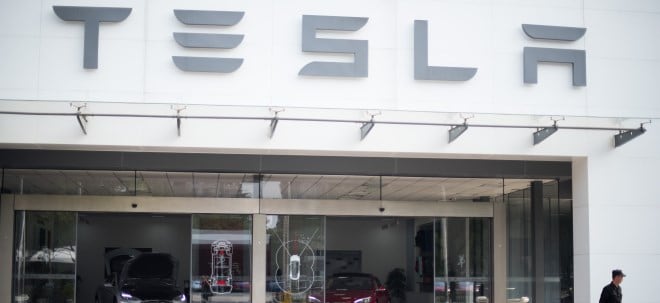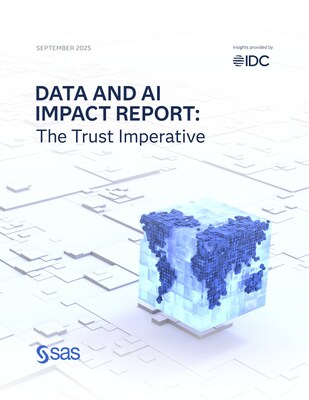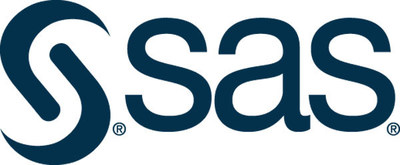Study: Trust in GenAI surges globally despite gaps in AI safeguards
Organizations building trustworthy AI are 60% more likely to double ROI of AI projects, underscoring the high cost of ignoring responsible practices
CARY, N.C., Sept. 30, 2025 /PRNewswire/ -- SAS, a global leader in data and AI, today unveiled new research that explores the use, impact and trustworthiness of AI. The IDC Data and AI Impact Report: The Trust Imperative, commissioned by SAS, found that IT and business leaders report having greater trust in generative AI than any other form of AI.
Per a new SAS study, GenAI trust is surging globally — but not ethical safeguards.The global research exploring AI use and adoption also found that only 40% are investing to make AI systems trustworthy through governance, explainability and ethical safeguards, even though organizations prioritizing trustworthy AI are 60% more likely to double ROI of AI projects. Paradoxically, among those reporting the least investment in trustworthy AI systems, GenAI (e.g., ChatGPT) was viewed as 200% more trustworthy than traditional AI (e.g., machine learning), despite the latter being the most established, reliable and explainable form of AI.
"Our research shows a contradiction: that forms of AI with humanlike interactivity and social familiarity seem to encourage the greatest trust, regardless of actual reliability or accuracy," said Kathy Lange, Research Director of the AI and Automation Practice at IDC. "As AI providers, professionals and personal users, we must ask: GenAI is trusted, but is it always trustworthy? And are leaders applying the necessary guardrails and AI governance practices to this emerging technology?"
Learn more at today's LinkedIn Live panel moderated by Nicholas Thompson, CEO of The Atlantic and featuring SAS, Deloitte and a guest speaker from IDC.
Access the full research report here: http://sas.com/ai-impact.
The research draws on a global survey of 2,375 respondents conducted across North America, Latin America, Europe, the Middle East and Africa, and Asia Pacific. Participants included a balanced mix of IT professionals and line-of-business leaders, offering perspectives from both technology and business functions.
Emerging AI technologies evoke most trust
Overall, the study found the most trusted AI deployments were emerging technologies, like GenAI and agentic AI, over more established forms of AI. Almost half of respondents (48%) reported "complete trust" in GenAI, while a third said the same for agentic AI (33%). The least trusted form of AI is traditional AI – less than one in five (18%) indicated complete trust.
Even as they reported high trust in GenAI and agentic AI, survey respondents expressed concerns, including data privacy (62%), transparency and explainability (57%), and ethical use (56%).
Meanwhile, quantum AI is picking up confidence quickly, even as the technology to execute most use cases has yet to be fully realized. Almost a third of global decision makers say they are familiar with quantum AI, and 26% report complete trust in the technology, despite real-world applications still in the early stages.
Lagging AI guardrails weaken AI impact ... and ROI
The study showed a rapid rise in AI usage – particularly GenAI, which has quickly eclipsed traditional AI in both visibility and application (81% vs. 66%). This has sparked a new level of risks and ethical concerns.
Across all regions, IDC researchers identified a misalignment in how much organizations trust AI versus how trustworthy the technology truly is. Per the study, while nearly 8 in 10 (78%) organizations claim to fully trust AI, only 40% have invested to make systems demonstrably trustworthy through AI governance, explainability and ethical safeguards.
The research also showed a low priority placed on implementing trustworthy AI measures when operationalizing AI projects. Among respondents' top three organizational priorities, only 2% selected developing an AI governance framework, and less than 10% reported developing a responsible AI policy. However, deprioritizing trustworthy AI measures may be preventing these organizations from fully realizing their AI investments down the road.
Researchers divided survey respondents into trustworthy AI leaders and trustworthy AI followers. Leaders invested the most in practices, technologies and governance frameworks to make their AI systems trustworthy – and appear to be reaping rewards. Those same trustworthy AI leaders were 1.6 times more likely to report double or greater ROI on their AI projects.
Lack of strong data foundations and governance stall AI
As AI systems become more autonomous and deeply integrated into critical processes, data foundations also become more important. The quality, diversity and governance of data directly influence AI outcomes, making smart data strategies essential to realizing benefits (e.g., ROI, productivity gains) and mitigating risks.
The study identified three major hurdles preventing success with AI implementations: weak data infrastructure, poor governance and a lack of AI skills. Nearly half (49%) of organizations cite data foundations that are not centralized or nonoptimized cloud data environments as a major barrier. This top concern was followed by a lack of sufficient data governance processes (44%) and a shortage of skilled specialists within their organization (41%).
Respondents reported the No. 1 issue with managing the data used in AI implementations to be difficulty in accessing relevant data sources (58%). Other leading concerns included data privacy and compliance issues (49%) and data quality (46%).
"For the good of society, businesses and employees – trust in AI is imperative," said Bryan Harris, Chief Technology Officer at SAS. "In order to achieve this, the AI industry must increase the success rate of implementations, humans must critically review AI results, and leadership must empower the workforce with AI."
About SAS
SAS is a global leader in data and AI. With SAS software and industry-specific solutions, organizations transform data into trusted decisions. SAS gives you THE POWER TO KNOW®.
SAS Innovate 2026 – a one-of-a-kind experience for business leaders, technical users, and SAS partners – is coming April 27–30, 2026 in Grapevine, Texas. Visit the SAS Innovate website for more information and to save the date!
SAS and all other SAS Institute Inc. product or service names are registered trademarks or trademarks of SAS Institute Inc. in the USA and other countries. ® indicates USA registration. Other brand and product names are trademarks of their respective companies. Copyright © 2025 SAS Institute Inc. All rights reserved.
Editorial Contacts: | |
Jennifer James | Julia Norton |
jennifer.james@sas.com | julia.norton@sas.com |
919-531-0858 | 919-531-4661 |
![]() View original content to download multimedia:https://www.prnewswire.com/news-releases/study-trust-in-genai-surges-globally-despite-gaps-in-ai-safeguards-302569592.html
View original content to download multimedia:https://www.prnewswire.com/news-releases/study-trust-in-genai-surges-globally-despite-gaps-in-ai-safeguards-302569592.html
SOURCE SAS



